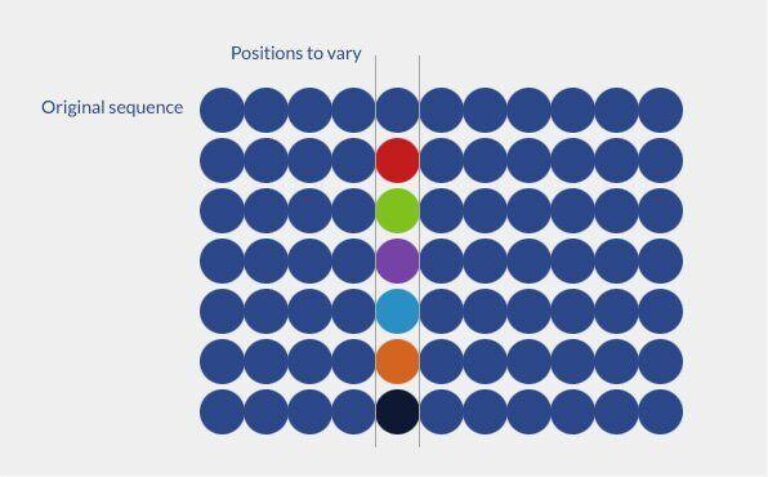Cart (0 Items)
Your cart is currently empty.
View Products
Understand the functional role of each residue of your protein of interest with ease. Enhance binding affinity and tailor substrate or epitope specificity with custom-made positional scanning libraries. Rapidly design your peptide library using our free generator tool and get your personalized quote directly delivered to your inbox.
If we do not succeed in synthesizing a peptide from your library,you don’t pay for it!
All the peptides synthesized are controlled by MS and HPLC.
We adapt the design and the purity depending on your project to provide you the best data at the best price!
Get 500 peptides in less than 1 month!
With 200 000+ peptides synthesized and 99+ % success rate,trust our unrivalled expertise.
We offer an unlimited range of modifications.
Positional scanning libraries are synthesized by systematically substituting one or several fixed residues within a peptide with all other amino acids. These combinatorial peptide libraries are quick to synthesize and screen, allowing researchers to understand the contribution of each residue on specific positions to the bioactivity of a peptide.

The most important benefit of this type of library is the ability to optimize sequences for enhanced binding activity. This feature can be leveraged in multiple types of biological assays, from the determination of substrate specificity to the analysis of T-cell recognition.
Make use of ProteoGenix’s free Peptide Library Generation tool to kick-start your projects:
Positional scanning libraries have been recognized as one of the best tools for fast and cost-effective sequence optimization. Throughout the years, these libraries have found multiple applications, including:
Combinatorial synthetic libraries have a significant advantage over biologically encoded libraries. The former allows the use of modified and unnatural amino acids that, in turn, empower researchers to ask more complex biological questions.
For instance, several studies have reported the use of positional scanning libraries to determine the role of post-translational modifications (e.g., glycosylation) in biological processes. By synthesizing libraries with the same amino acid residues with or without glycans, it is possible to establish the role of these modifying groups in the protein-protein interface.
However, positional scanning libraries are more commonly used to measure enzyme-substrate specificity. For instance, determining the exact cleavage sites of proteases is important for the study of cancer development and progression. This type of functional assay can help identify endogenous substrates and signaling pathways, as well as aid in the discovery of new disease markers and potential targets for differential or early diagnosis, and drug development.
Positional scanning peptide libraries have also recently emerged as promising tools for the analysis of T cell recognition. This is particularly useful when developing peptide vaccines able to elicit strong and long-lasting immunogenic responses, with implications for both cancer treatment and infectious diseases.
In sum, positional scanning libraries are one of the most cost-effective strategies to enhance bioactivity, with extensive application in vaccine development and drug discovery. Learn more about the unique capabilities of our peptide synthesis platform and discover how we can work together to bring your most challenging projects to fruition:
You could also be interested in:
